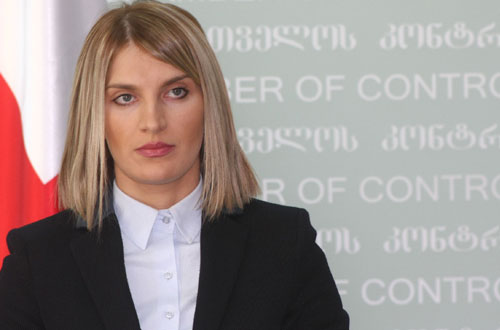| State Audit Agency Launches Party Funding Monitoring Unit |
| Civil Georgia, Tbilisi / 4 Jan.'12 / 16:05 |

Natia Mogeladze, a former prosecutor, has been appointed as head of the new unit at the state audit agency, which is in charge of monitoring political parties’ funding, January 4. Photo: InterPressNews.
The state audit agency, Chamber of Control, announced on January 4 about the launch of its new unit, which will be in charge of monitoring funding of political parties.
Under the new legislative amendments on party funding, adopted in late December, the Chamber of Control became a key agency in overseeing compliance of political parties with the new tightened funding regulations.
“We are ready and willing to cooperate closely with each and every political party and to develop effective communication with them in order to provide transparency of funding envisaged by the law,” Natia Mogeladze, head of the new unit at the Chamber of Control, said on January 4.
Mogeladze previously served as a prosecutor; she was one of the prosecutors in Georgia’s first-ever jury trial in autumn, 2011.
A day earlier, on January 3, head of the Chamber of Control, Levan Bezhashvili, and President of National Bank of Georgia, Giorgi Kadagidze, signed a memorandum on cooperation. The Chamber of Control said that the central bank would help the agency in verifying “accuracy of the data provided by political parties.”
Previously the Central Election Commission was in charge of monitoring political parties’ finances, but its authority in this respect was extremely limited.
Political parties will have to notify the Chamber of Control about donations, which should be made through bank wire transfers, within three working days after receiving such donations.
Parties will submit their financial declarations to the Chamber of Control every year before February 1 and the Chamber of Control will have to post these declarations on its website. Chamber of Control will be authorized to impose GEL 5,000 fine on a political party in case of its failure to meet disclosure requirements envisaged by these regulations. During the electoral period the parties will have to submit to the agency declarations once in every three weeks.
Under the new regulations, the Chamber of Control has the powers to impound property, including bank account, of a political party, legal entity or of an individual person; this decision by the Chamber of Control can be appealed to the court, but the agency’s decision on impoundment will not be suspended during the court proceedings.
The new party funding regulations ban corporate donations. It also envisages doubling of donation cap that a single individual person can provide to a party from previously allowed maximum of GEL 30,000 to GEL 60,000 per year; it also introduced a cap of GEL 1,200 for party membership fee annually from each member.
According to the new regulations if a group of individual donors have the same source of income (for example if they are employees of the same company) their aggregate donation to a single party should not exceed GEL 500,000 annually.
In separate, but related legislative amendments passed in late December to the criminal code, which tightens punishment for and measures against political bribery, making sham deals “for a purpose of evading restrictions” set by the law became punishable with a fine or imprisonment for up to three years.
The new party funding regulations ban a party and its representative or a third person affiliated with a party to donate money, gifts and other material benefits, as well as to sell goods under discount price or to procure goods for higher than market price. It also bans parties to promise money, securities, or other material benefits to the Georgian citizens.
Similar restrictions will also apply to legal entities, which are “related, directly or indirectly, to a political party or are otherwise under the control of a political party.” The law defines such potential linkage when a legal entity’s “expenses directly or indirectly are related to the activities or goals of a political party.”
The parties will have the right to donate gifts during various festivities, but the total amount of such stuff should not exceed GEL 5,000 annually.
Total amount of a party’s overall annual funding – received from all sources, whether from donations, membership fees, or state funding – should not exceed 0.2% of the previous year’s GDP.
